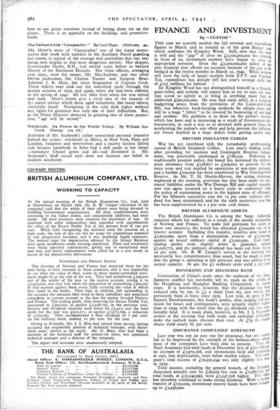FINANCE AND INVESTMENT
By ,fi CUSTOS " THIS year we scarcely needed the full revenue and expenditure figures to March 31st to remind us of the grim Budget task which confronts Sir Kingsley Wood. Still, now that the story is told and the " gap " of close on £2,5oo,000,000 lies yawning in front of us, investment markets have begun to show an appropriate restraint. Even the £2,5oo,000,000 deficit of the past financial year affords no accurate measure of the gap to be bridged in the twelve months to March. 31, 1942. While revenue will have the help of larger receipts from E.P.T. and Purchase Tax, expenditure has already left last year's average daily rate of Liof millions far behind. • Sir Kingsley Wood has not distinguished himself as a financial giant-killer, and nobody will expect him to try to turn the taxa- tion screw so tightly as to bring in anything more than an additional £200,000,000. He may find some relief, in a technical budgetting sense, from the provisions of the Lease-and-Lend Bill, but whatever book-keeping methods he adopts there will still be a huge " deficit " to be covered by_borrowing of one kind and another. His problem is to draw on the nation's income, which has been and is increasing as a result of Government dis- bursements, in such a way as to dovetail with general plans for accelerating the nation's war effort and help prevent the inflation- ary forces implied in a large deficit from getting under way.
BRITISH INSULATED CABLES
War has not interfered with the remarkable profit-earning record of British Insulated Cables. Last year's trading result, after providing for taxation and Contingent Reserves Adjust- ment, was practically unchanged at -4786,232. Following its traditionally prudent policy, the board has increased the depreci- ation allowance from £158,617 to £209,622 to provide for the extra wear and tear implied by operations at war-time pressure, and a further £roo,000 has been transferred to War Contingencies Reserve. As Mr. T. H. Martin-Harvey, the acting chairman, explained at the meeting, provision has also been made for esti- mated liabilities under the War Damage Bill and capital expendi- ture was again incurred on a heavy scale in conformity with the policy of maintaining assets in the highest state of efficiency. For the fifteenth successive year the r5 per cent. ordinary divi- dend has been maintained, and for the sixth successive year this has been supplemented by a 5 per cent. cash bonus.
BRITISH ALUMINIUM ASSETS
The British Aluminium- Co. is among the large industrial concerns which has suffered as a result of the enemy occupation of Norway and France. To make full provision for assets in these two countries the board has allocated £5oo,000 out of its reserve account. Including this transfer, reserves. now stand at £2,95o,000, apart from a depreciation reserve of £1,5oo,o00, against an issued ordinary capital of £3,000,000. Last year's trading profits were slightly down at a00,6o2, against £1,058,772, and the ordinary dividend has been cut from 121 to ro per cent. Mr. R. W. Cooper's survey at the meeting was necessarily less comprehensive than usual, but he made it plain that the group is operating at full pressure and was adding to its output capacity. At 4os. the £r ordinary units yield 5 per cent.
HONGKONG AND SHANGHAI BANK
Contraction of China's trade since the outbreak of the Sino- Japanese conflict has inevitably left its mark on the profits of the Hongkong and Shanghai Banking Corporation in recent years. It is noteworthy, however, that the dividend has been reduced only by los. to £5 a share from the rate which had previously been in force since 1935. Last year, in spite of Far Eastern Developments, this bank's profits, after making full pro• vision for losses and contingencies, were actually slightly higher than in 1939, with the result that the £5 dividend rate was cam' fortably held. It is made plain, however, in Mr. J. J. Paterson s review at the meeting that both trade and exchange difficulties make the outlook more obscure than ever. At £74 the batiks shares yield nearly 61 per cent.
INSURANCE COMPANIES' STRENGTH Last year was not an easy one for insurance, but one cannot fail to be impressed by the strength of the balance-sheets wind' most of the companies have been able to present. Thus, the Pearl Assurance had total funds at December 31st of kit2,389,,...143' an increase of £3,970,368, and investments held and aPPearws at cost, less depreciation, were below market values. This com- pany's total income of £19,931,244 was only slightly less than in 1939. Total income, excluding the general branch, of the Britannic, Assurance actually rose by £38,019 last year to £7,086,859, an total funds, at £35,240,995, were £1,547,358 higher. This office_ has therefore continued to make strong headway. With a furth' transfer of L15o,000, investment reserve funds have been bough' up to £2,250,000.


























 Previous page
Previous page